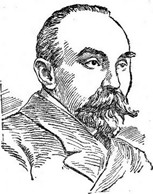
Birthday anniversary of George V. Plekhanov, founder of the Marxism in Russia
29 November (11 December), 1856 in the village of Gudalovka (now Lipetsk region), into a small gentry family was born George V. Plekhanov, Russian revolutionary, theorist and propagandist of Marxism, philosopher, eminent figure of the Russian and international socialist movement.
In 1873 Plekhanov graduated from the Voronezh military school and entered the Konstantin Cadet School in Petersburg. A year later, however, he was disappointed in the military career, and entered the Petersburg Mining Institute. In December of 1876, during the first Russian political demonstration of workers and students, near the Kazan Cathedral he made the antimonarchic speech supporting the ides of the Russian revolutionary and writer N. G. Chernyshevsky. Avoiding the arrest, Plekhanov went underground. In July 1877 he became one of the leaders of an illegal organization, the society of Narodniks “Land and Freedom”, worked on creation of the program of the society, and was one of the editors of its paper. After the split of the “Land and Freedom” in 1879, Plekhanov headed another Narodniks’ organization, “Black Redivision”.
In January 1880 Plekhanov, escaping from the arrest, emigrated to Europe. Abroad, he attended lectures in the Sorbonne and Geneva Universities, studied Marxist literature, the history of the West European workers’ movement, met with the leaders of social-democratic organizations. In 1882 Plekhanov translated into Russia the “Manifesto of the Communist Party” by K. Marx and F. Engels, and a year later founded the first Russian Marxist organization – “Liberation of Labor” group.
In the end of 1894 – early 1895, on the initiative of Plekhanov was created the “Union of Russian social democrats abroad”. In 1900–1903 he also contributed to the creation and management of the “Iskra” paper. In 1901 the Russian revolutionary was one of the organizers of the “Foreign League of the Russian social democracy”. He also contributed efficiently in the preparing of the 2nd congress of the Russian Social Democratic Labor Party in the summer of 1903. Soon after the congress, due to strong disagreements with V. I. Lenin, Plekhanov became one of the leaders of the Mensheviks faction of the Social-Democratic Party of Russia.
During the first Russian revolution of 1905-1907 Plekhanov, being abroad, opposed to Bolsheviks in basic tactical questions. He considered the strike which led to the December armed revolt in Moscow (1905) ill-timed. In 1906-1907 the politician stood up for unification of social-democrats with cadets for the elections to the State Duma, he contributed to the all-party paper “Social-democrat” and Bolsheviks’ editions. In this period Plekhanov published a series of articles supporting the philosophy of Marxism, and from 1909 he started working on his fundamental work “The history of the Russian public idea” (3 volumes, St. Petersburg, 1914-16). In this work the revolutionary, along with class struggle, noted for the first time their “co-operation when there is need to defend the country from a foreign enemy”.
During the World War I Plekhanov took the side of the Allies opposing Germany and called for the struggle with the German imperialism. The February Revolution of 1917 enabled Plekhanov to return to Russia after 37 years of exile. In April he spoke at the All-Russian meeting of the Soviets about his attitude to the revolutionary events in Russia. Plekhanov supported the continuation of war in order to defend the motherland and the revolution, urging to avoid everything that might provoke “premature civil war” and “misunderstandings between the population and the army”.
After his return to Russia Plekhanov was not admitted to the Executive Committee of the Petrograd Soviet of Workers’ and Soldiers’ Deputies due to his pro-allied position during the war which was not supported by the Soviet figures. Besides, his health was continuously worsening and he was forced to confine himself to editing his paper “Unity” where he published articles revealing the most important political events, disputed with his opponents and ideological rivals.
Polemicizing with Lenin about his “April Theses”, Plekhanov reproached the latter that he considered the war as a predatory and imperial one, but only from the Russian side, not saying a word about Germany. Plekhanov also accused Lenin of digressing from the scientific socialism since Lenin called for overthrow of capitalism in Russia in spite the fact that it had not yet reached the degree so it would impede the development of productive forces. On the whole, Plekhanov characterized Lenin’s “Theses” as “a reckless and quite harmful effort to spread anarchist discord in the Russian Land”.
Plekhanov did not support the October Revolution believing that Russia was not ready for the socialist revolution. He warned that seizure of power by “one class, or even worse, by one party” could lead to tragic consequences.
In 1918 Plekhanov’s health continued to worsen. He was hospitalized and then sent to a sanatorium near the town of Terioki (now Zelenogorsk, Leningrad Region). There, May 30, 1918 George V. Plekhanov died. He was buried at the Volkovo Cemetery in Petrograd.
Lit.: Бережанский А. С. Г. В. Плеханов. Воронеж, 1990; Ваганян В. А. Г. В. Плеханов. М., 1924; Вольфсон С. Я. Плеханов. Минск, 1924; Коротаев Ф. С. Г. В. Плеханов. Человек и политик. Пермь, 1992; Лившиц М. А. Г. В. Плеханов. М., 1983; Плеханов Г. В. Избранные философские произведения. Т. 1—5. М., 1956-58;
Сидоров М. И. Г. В. Плеханов и вопросы истории русской революционно-демократической мысли XIX в. М., 1957; Тютюкин С. В. Г. В. Плеханов. Судьба русского марксиста. М., 1997; Фомина В. А. Философское наследие Г. В. Плеханова. М., 1956; Чагин Б. А. Г. В. Плеханов и его роль в развитии марксистской философии. М.; Л., 1963; Шишков Н. И. Этические воззрения Г. В. Плеханова. Кишинев, 1987.
Based on the Presidential Library’s materials:
Аптекман О. В. Георгий Валентинович Плеханов: из личных воспоминаний. Л., 1924;
Плеханов Г. В. На два фронта: Сборник политических статей. Женева, 1905;
Плеханов Г. В. О войне : Ответ товарищу З.П. Paris, 1914;
События в Петрограде летом 1917 года : [фрагменты кинохроники]. СПб., 2011;

